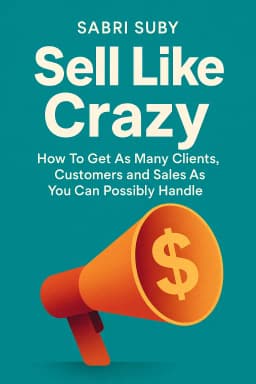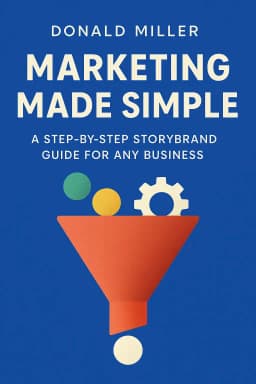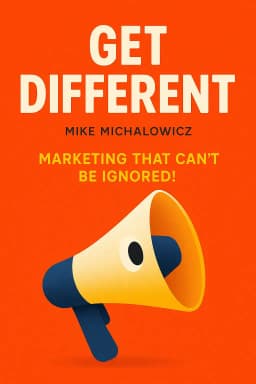
The Innovator's Playbook: Decoding the System to Sell Like Crazy
Golden Hook & Introduction
SECTION
Prof. Eleanor Hart: What if I told you that the most powerful innovators, people like Steve Jobs or Jeff Bezos, weren't just visionaries, but were also masters of a skill many of us try to avoid: selling? Not the pushy, in-your-face kind, but a deep, psychological system for making ideas irresistible. Today, we’re looking at a book called 'Sell Like Crazy,' but we're reading it as something else entirely: a hidden playbook for leadership and innovation. I’m Professor Eleanor Hart, and with me is chengzi353, a curious and deeply analytical thinker who loves exploring the systems behind success. Welcome!
chengzi353: It's great to be here, Eleanor. I love this framing. Taking a book that seems to be about one thing and finding a deeper, more universal principle inside.
Prof. Eleanor Hart: Exactly. And Sabri Suby’s book is packed with them. So today we'll dive deep into this from two perspectives. First, we'll explore the mindset of extreme focus with what the author calls 'The 4% Rule,' a radical take on productivity. And then, we'll discuss how to channel that focus into creating something the world can't refuse with 'The Godfather Strategy.'
chengzi353: Focus and irresistibility. That sounds like a recipe for disruption. I'm in.
Deep Dive into Core Topic 1: The 4% Rule
SECTION
Prof. Eleanor Hart: So, chengzi353, let's start with that internal mindset. The book argues that most of us are busy, but not productive. It introduces this idea of the 4% rule. Now, most people have heard of the 80/20 rule, right? That 20% of your efforts produce 80% of your results.
chengzi353: Of course, the Pareto Principle. It's a classic productivity concept.
Prof. Eleanor Hart: Precisely. But Suby takes it a step further, applying it exponentially. He says, if you take the top 20% of that top 20%... you get the top 4%. And those top 4% of your activities, he argues, are responsible for a staggering 64% of your results. He calls this the 4% rule.
chengzi353: Wow. So it’s not just about prioritizing, it’s about a level of ruthless focus that most of us would find almost uncomfortable. We're talking about ignoring 96% of what we do.
Prof. Eleanor Hart: Exactly. And he uses a fantastic story to illustrate this. It's about John Paul DeJoria, the billionaire co-founder of Paul Mitchell hair products and Patrón tequila. He started with nothing, literally sleeping in his car. But as he built his empire, he developed this extreme discipline. To this day, DeJoria refuses to use email or a smartphone.
chengzi353: That's unbelievable. In our hyper-connected world, that sounds like a superpower. How does he even function?
Prof. Eleanor Hart: His assistants handle all of that. He forces all communication to be distilled down to a single page, and he only engages with what he calls 'high-return activities.' His philosophy is that the more successful you become, the more your success is defined by what you say 'no' to. He’s found his 4%—the big deals, the key relationships, the major strategic decisions—and he ruthlessly delegates or eliminates everything else.
chengzi353: That's a radical idea, Eleanor. It makes me think about leadership. So many leaders get bogged down in what the book calls 'little chores'—replying to every email, sitting in on every meeting. They become a bottleneck. How does someone in a leadership position, who is constantly pulled in different directions, even begin to identify their 4%?
Prof. Eleanor Hart: That's the key question, isn't it? The book suggests a practical, if brutal, exercise: a time audit. You calculate what your 'aspirational hourly rate' should be. Let's say it's $500 an hour. Then you look at your to-do list. If a task can be outsourced or delegated for less than that—say, to a virtual assistant for $50 an hour—then you, as the leader, should not be doing it. It’s about shifting from working the business to working it.
chengzi353: Right. It's a mindset shift from being a doer to being a strategist. It's not about laziness; it's about leverage. This reminds me of Indra Nooyi's time at PepsiCo. She was famous for her obsessive focus on 'Performance with Purpose.' That was her 4%—ensuring long-term sustainability and health were at the core of every single decision, not just short-term profits. She trusted her team to handle the day-to-day execution. She was working the future of the company, not just its present.
Prof. Eleanor Hart: What a perfect parallel. She identified the one thing that would have the most profound, long-term impact and made it her non-negotiable focus. That is the 4% rule in action at the highest level of corporate leadership.
Deep Dive into Core Topic 2: The Godfather Strategy
SECTION
Prof. Eleanor Hart: And that idea of leverage is the perfect bridge to our second topic. Because once you've freed up your focus by finding your 4%, you need to apply it to something incredibly powerful. Suby calls this 'The Godfather Strategy.'
chengzi353: I love the name. It’s dramatic. "An offer they can't refuse."
Prof. Eleanor Hart: Exactly. But it's not about pressure or intimidation. It's about creating an offer so good, so empathetic, and so risk-free that it becomes the most logical, almost inevitable, choice for the customer. It's about engineering away all the reasons they might say 'no'.
chengzi353: So it's a psychological strategy, not a sales tactic.
Prof. Eleanor Hart: Precisely. And the best story to illustrate this is the disruption of the mattress industry by a company called Casper. Think about the old way of buying a mattress. You go to a massive showroom, you feel overwhelmed by choice, you awkwardly lie on 20 different beds for 30 seconds while a salesperson hovers over you...
chengzi353: It’s a terrible experience. High-pressure, confusing, and you end up spending thousands of dollars on something you're not even sure you'll like after a full night's sleep.
Prof. Eleanor Hart: Exactly. You're full of doubt and anxiety. Casper saw this and created a Godfather Offer. They said: 'Forget all that. We have one, universally comfortable, perfect mattress. We will ship it to your door, in a box, for free. You can sleep on it for 100 nights. And if, for any reason, you don't absolutely love it, we will come to your house, pick it up for free, and give you a full refund. No questions asked.'
chengzi353: That's brilliant. So the real innovation wasn't just the mattress-in-a-box, it was in the business model itself. They identified the biggest and in the buying process—the fear of making the wrong choice, the hassle of delivery, the risk of buyer's remorse—and they systematically eliminated every single one of them. That's a profound lesson in empathy and creative problem-solving.
Prof. Eleanor Hart: You've hit the nail on the head. The book breaks the Godfather Offer down into components: a strong rationale, a power guarantee, scarcity, and so on. But the core idea, as you said, is empathy. It's about deeply understanding what people want and what they fear, and then building your entire offer around that. It's selling what people to buy, not what you want to sell.
chengzi353: And that connects directly back to the innovators I'm so interested in. The first iPhone wasn't the first smartphone, not by a long shot. But its 'offer'—the incredibly intuitive interface, the seamless integration of music and phone, and later the App Store ecosystem—was so complete and solved so many existing frustrations that it felt irresistible. It wasn't just a list of features; it was a holistic, frictionless solution to a problem people didn't even know they had. This 'Godfather Strategy' is really a framework for great, user-centric design and innovation.
Prof. Eleanor Hart: It absolutely is. It’s about making your solution the path of least resistance, both functionally and emotionally.
Synthesis & Takeaways
SECTION
Prof. Eleanor Hart: So, as we bring this all together, it seems the 'Sell Like Crazy' system, when we view it through this innovation lens, is really about a powerful duality. First, it's about an internal discipline to find and protect your focus, to work only on the vital few activities—that 4%.
chengzi353: And second, it’s about using that freed-up energy for external creativity. To design an offer so empathetic, so user-centric, and so risk-free that it becomes the obvious, most compelling choice in the market.
Prof. Eleanor Hart: A perfect summary. The focus fuels the creativity, and the creativity makes the focus worthwhile. It’s a complete engine for growth.
chengzi353: Absolutely. It's a powerful combination for anyone trying to build something meaningful, whether it's a company, a project, or even just a personal brand. So for everyone listening, here's a thought to take with you, inspired by today's conversation.
Prof. Eleanor Hart: I'm ready.
chengzi353: What is the single biggest point of friction or fear in your customer's—or even your team's—experience? And what's one bold, 'Godfather'-style change you could make to eliminate it completely?
Prof. Eleanor Hart: A fantastic and challenging question. Thank you so much for these insights, chengzi353.
chengzi353: The pleasure was all mine, Eleanor.









